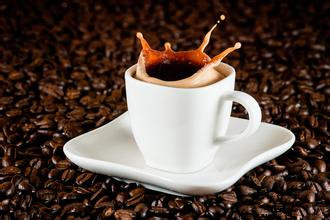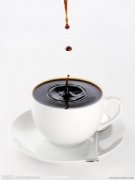History of Fine Coffee Culture Coffee Culture in France
I have heard that France once drank less coffee because of a shortage of coffee, and immediately saw more people taking a nap. It may seem like an exaggeration, but it is true that the French are addicted to coffee. When the "Gulf War" broke out in 1991, France was also one of the countries participating in the war. some ordinary people in China worried that the war would affect the supply of daily necessities and rushed to supermarkets to buy them. Even the TV station was alarmed by the fact that when the camera looked at customers who were full of "scarce supplies", they found that they took the most coffee and sugar. At one point, it became a big joke at that time.

The French do not seem to pay attention to the taste, but the environment and atmosphere. Most of them do not want to drink alone behind closed doors, but join in the fun outside, even if the price of a small cup is enough to make a pot at home. They did not drink hurriedly, but tasted slowly, tasted carefully, read books and newspapers, talked about it, and drank it for most of the day. French people develop this habit of drinking coffee, whether they consciously express a kind of elegant charm, a kind of romantic sentiment, a kind of freehand feeling of enjoying life. It can be said that this is a traditional and unique coffee culture. Because of this, the places where people can rest and drink coffee in France can be said to be all over the streets, roadsides, squares, riverbanks, cruise ships, and even the Eiffel Tower. And the form, style, size are not limited to one style, there are coffee shops, restaurants, halls, rooms. And the most popular and romantic ones are those open-air cafes, which are almost a portrayal of French life. No wonder the tasteful French have a traditional saying that it may be more difficult to get someone to change a cafe by the Seine than to change a religion! In an authentic cafe, regular customers not only never change their coffee shop easily, but also have a fixed time to come to the cafe and the habit of which coffee table to sit on. Of course, this loyal relationship is also reflected in the hospitable and tireless host, without greeting, the old waiter who is familiar with his frequent customers' temper and hobby will bring his favorite kind of coffee, accompanied by a plate of special snacks, and even bring his favorite newspapers and periodicals, needless to say thank you, which are taken for granted in an authentic cafe.
Cafes in France started a prairie fire in the streets of Paris as early as the 18th century. The free and warm atmosphere made the cafe gradually become a place for French intellectuals to criticize the imperial government at that time, which played a catalytic role in the French Revolution of 1789.
The coffee of the French is actually far less exquisite than that of their cafes. Compared with other European peoples, the French have a light taste of coffee, and because French coffee basically comes from French colonies, and most of their colonies are in Africa. As a result, Robusta beans, rich in Africa, became food for the French. Robota beans belong to the sturdy beans of coffee beans, which are not sour, but bitter and fishy. In order to cover up this bad taste, the French invented heavily roasted French carbon coffee, masking it with the bitter smell of roasted to black carbon.
French cafes are world-famous, and the romantic atmosphere of French cafes attracts countless tourists to pay homage. It is obvious that the price of a cup of coffee in a cafe is far higher than that of a pot at home, but the French just go to the cafe, and always go to the place they like or are used to, do their own seats, drink the same coffee every time, or even match the same refreshments. And the waiters in the cafe also have a French tacit understanding. They don't need to communicate with each other and say a few words to get the kind of service you want. Whether it's seats, music, coffee, snacks or newspapers.
The earliest and most famous Prokop Cafe in Paris, opened in 1689, is owned by Italian immigrants. As soon as the cafe, located in the French Comedy Theatre in the Latin district, opened, it was full of customers, actors, novelists, playwrights and musicians gathered here. It is said that Napoleon had no money for coffee here before the French Revolution, so he had to leave his cap to cover the bill.
When the wave of the French Revolution passed, the spirit of French literature and art, which has always been the heyday of literary style, achieved unprecedented prosperity in times of peace, including novelists, playwrights, publishers, painters and musicians. Paris is like a huge magnet that attracts talented young people. And the cafe is their favorite place to go.
Nowadays, the poor literati and unsuccessful artists who have become masters have a good habit, that is, they usually have their own fixed cafes or even fixed seats. It's hard to say whether it's the Parisian ethos that infects them, or whether they infect Parisians-almost every Parisian has their own fixed cafe, and the time they come to the cafe, the seats they sit and the coffee they drink are fixed.
Important Notice :
前街咖啡 FrontStreet Coffee has moved to new addredd:
FrontStreet Coffee Address: 315,Donghua East Road,GuangZhou
Tel:020 38364473
- Prev

Coffee Culture History of British Literary Cafe
It is known all over the world that English people are addicted to tea. But from the mid-17th century to the early 18th century, the whole of London was soaked in coffee instead of tea. British men switch from drinking to drinking coffee, or both. When they get drunk in a pub, they go to the cafe to sober up with caffeine and then go to the pub to continue drinking. The first coffee shop in England, which appeared at Oxford University in 1650, was a
- Next

The Coffee Culture of Northern Europe in the History of Fine Coffee Culture
Not as enthusiastic as the Italians or as romantic as the French, people in central and northern Europe drink coffee rationally and gently, just like their organized nationality. European life and coffee have become almost inextricably linked, except for the unusual way of drinking coffee in Italy and France, from Austria, Switzerland, Germany to the north.
Related
- How did the Salvadoran coffee industry develop in Central America?
- What exactly does the golden cup extraction of coffee mean?
- The Origin of Coffee flower
- [2023 Starbucks World Earth Day] there are more meaningful things besides free Starbucks coffee!
- What kind of coffee is there in Spain? 9 Flavors of Spanish Coffee
- Aromatic African coffee| Kenya's coffee culture and historical production area
- Liberica Coffee Bean knowledge: the characteristics of Liberian Coffee beans of the three original species of Coffee beans
- The origin and formula of Spanish latte introduces the taste characteristics of Bombon coffee in Valencia, Spain.
- How to adjust the solution of over-extracted coffee
- What is the tasting period of coffee beans? What is the period of coffee and beans? How should coffee wake up and raise beans?

